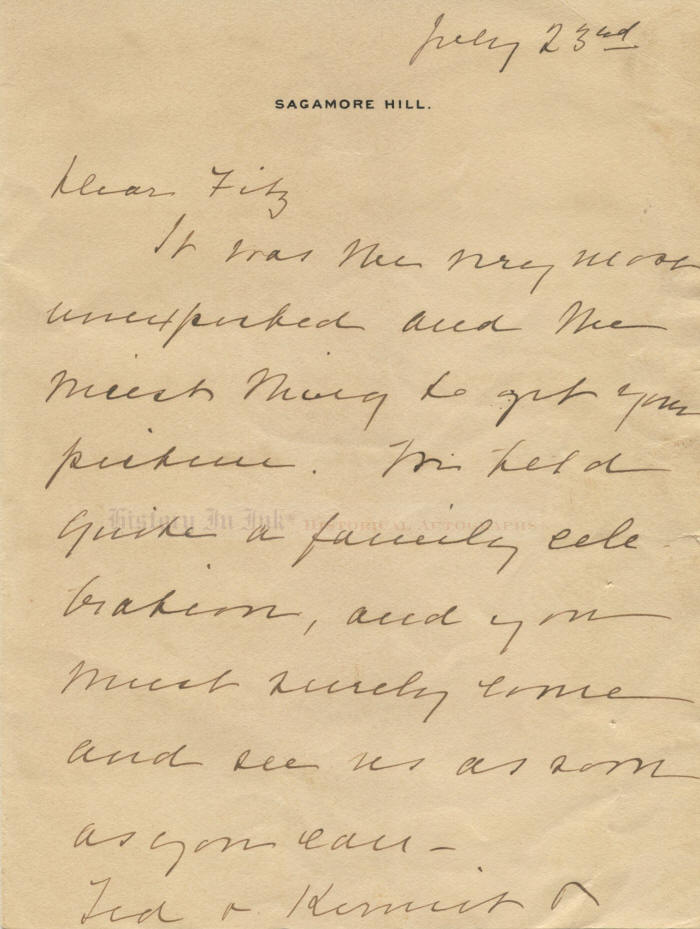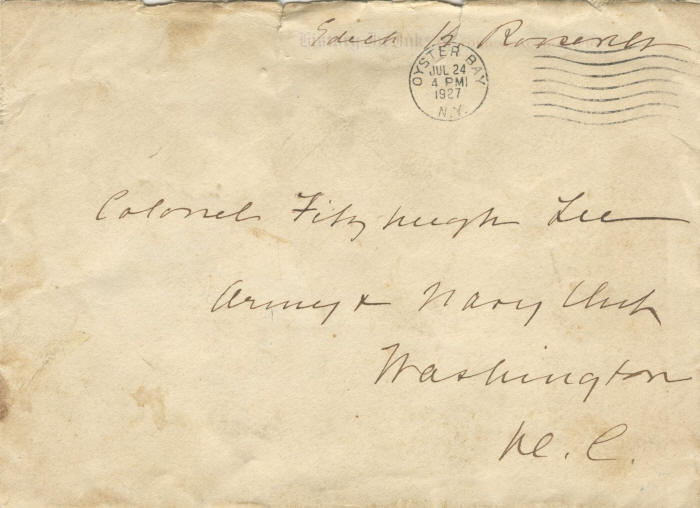


2405301
Edith Kermit Roosevelt
Mrs. Roosevelt writes to President Theodore Roosevelt’s former aide:
“Long Island is much gayer to me tha[n] Washington in these days.”
Edith Kermit Carow Roosevelt, 1861–1948. First Lady of the United States, 1901–1909. Autograph letter signed, Edith Kermit Roosevelt, four pages (front and back of front and integral leaves), 5” x 6¾”, on engraved stationery of Sagamore Hill, [Oyster Bay, New York], July 23, 1927. With original mailing envelope hand franked, Edith K. Roosevelt.
This letter provides two signatures of Mrs. Roosevelt, one on the letter and the other on the free-franked envelope. Mrs. Roosevelt writes to Col. Fitzhugh “Fitz” Lee (1878–1954), a former aide to President Theodore Roosevelt and the son and namesake of Confederate Maj. Gen. Fitzhugh Lee (1835–1905), who served as the Governor of Virginia after the Civil War.
In this chatty letter, Mrs. Roosevelt thanks Lee for his photograph and mentions four of her five children. She writes, in full: “It was the very most unexpected and the nicest thing to get your picture. We held quite a family celebration, and you must surely come and see us as soon as you can— / Ted & Kermit & Archie all live near me. So does Ethel usually but this summer she rented her house and has gone to Cornish, & a long way off Vermont seems to me— / The Rixeys had a golden wedding last spring & I saw many old friends there, but I came home on the night train. Long Island is much gayer to me that [sic] Washington in these days. / Congratulations on your new detail but I know how you feel about leaving the regiment. Have you read a book by General Maurice,—an Englishman,—called ‘Robert E. Lee Soldier’ If not I should like to send it to you. / Always sincerely yours . . . ”
Col. Lee served in the United States Army, 3rd Cavalry. As a captain, he was a military aide to President Roosevelt. The President mentioned him in at least two of his letters letters, including one he sent to President William Howard Taft in 1911 naming Lee as a colonel he would like to appoint should the United States have a serious war with Mexico and should Roosevelt be given command of a cavalry division such as the Roughriders that he commanded in Cuba. See Theodore Roosevelt to William Howard Taft, Mar. 14, 1911, reprinted in The Library of America, Theodore Roosevelt: Letters and Speeches 641 (2004).
Lee was appointed as the aide-de-camp to Maj. Gen. Frederick Funston in February 1916. A month later, he and Funston, who were stationed at Fort Sam Houston, Texas, served under General John J. Pershing in the Army’s pursuit of Mexican revolutionary Francisco “Pancho” Villa into Mexican territory after Villa’s raid on Columbus, New Mexico. American forces failed to capture Villa and were ordered back to the United States in 1917. Lee then became an officer in the 7th Cavalry in Texas and was promoted to colonel by 1919 He commanded the 7th Cavalry until 1927, the year of this letter. Mrs. Roosevelt mentions here that he was “leaving the regiment” for a “new detail.”
Mrs. Roosevelt’s statement that the “Rixeys had a gold wedding last spring” refers to Dr. Presley Marion Rixey (1852–1928) and his wife Earlena I. English Rixey (1855–1935), who were married April 25, 1877. Dr. Rixey served 36 years in the United States Navy, retiring with the rank of Rear Admiral. He was the official White House physician to Presidents William McKinley and Theodore Roosevelt. He was in Buffalo, New York, with the presidential party when McKinley, the third President to be assassinated, was shot, and he attended McKinley after the shooting. Roosevelt, carrying out McKinley’s promise, appointed Rixey to be Surgeon General of the Navy in 1902 and reappointed him in 1906. Rixey retired in 1910. The Rixeys celebrated their 50th wedding anniversary at “Rixey,” their country mansion in Arlington County, Virginia, in 1927.
Mrs. Roosevelt’s reference to Vermont is a mistake. Cornish, the town she mentioned, is actually in New Hampshire, directly across the river from Windsor, Vermont. Windsor was the summer retreat of Judge Learned Hand, the most qualified person never to sit on the United States Supreme Court.
The letter is uniformly toned. Mrs. Roosevelt has written and signed in black fountain pen. There are two corresponding pin holes on the front and integral leaves. One hole touches one letter of the text on the back of the integral leaf. The left edges of both leaves show evidence of handling, and there is corresponding light soiling there. The envelope is soiled and stained, and a tear from how it was opened affects the middle initial of Mrs. Roosevelt’s franking signature. Overall, the envelope is in good to very good condition, and the letter is in fine condition.
This letter is a good example of Mrs. Roosevelt’s somewhat difficult holograph. The additional signature on the envelope gives added value.
Unframed.
_____________
This item has been sold, but
click here to see other
Presidents and First Ladies items
that we are offering.



